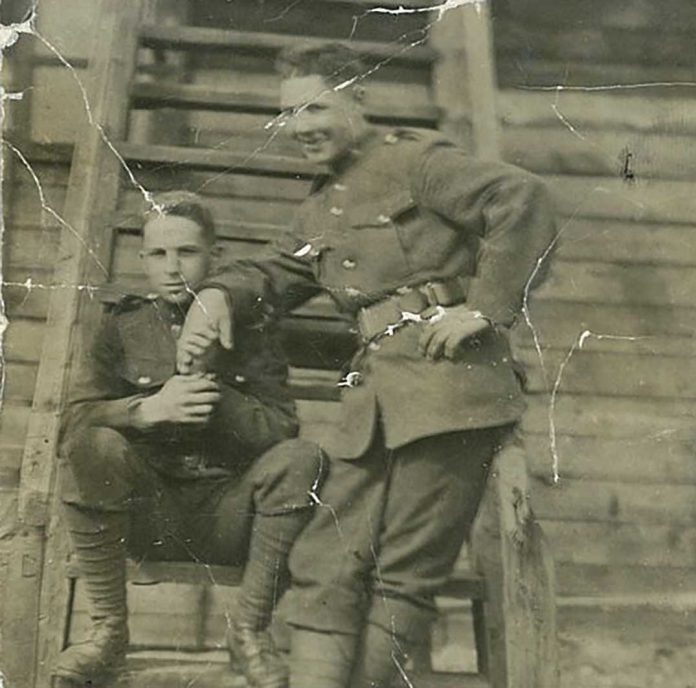
When Sally (Marshall) Stewart’s father Hugh Stewart enlisted in the army he wasn’t yet 18, so although the army recruiting officer handed over his shilling, it would be a little longer until he went into the killing fields of 1916 Europe.
“If kids lied about their age and they found out, they just kept them in England until they came of age before sending over the English Channel to France,” she said.
Hugh Stewart was a hero to his daughter, and in fact to more than a few of the blokes he served with overseas. But like many of the children of veterans, Ms. Stewart’s knowledge of her father’s service was only garnered in bits and drabs acquired over the years.
“I do know that there were a lot of young men who went west from Schreiber to Winnipeg to enlist,” she said. “They all went out to Winnipeg and there were lots of guys.”
Mr. Stewart’s first job when he arrived in France was as a bicycle messenger, but as cosy a gig as that might suggest, it was no guarantee of safety in the maelstrom that was World War One. “He was gassed at Vimy,” recalled Ms. Stewart. “My dad was 50 by the time I was born and he was 33 by the time he married my mom in 1922. I had three brothers, all older.”
Mr. Stewart was working for the Canadian Pacific Railroad (CPR) when he joined up, and when he returned from the war, like a lot of returning soldiers, he took up where he left off at the CPR.
“Although my dad didn’t talk much about the war he was a real hero to me, and not just to me either,” recalled Ms. Stewart. “I used to travel to school from Schreiber on a CPR rail pass and there was this one conductor who was always really nice to me. I told my dad and he asked me if I had noticed the conductor’s scar. I had, it was a terrible scar.”
It turns out the scar came from a wound that the conductor received at the front. “My dad said that he was lying on top of him when it happened,” she said. “My dad told me he dragged him off to a safe place. It was just in conversation, not something he made a big deal of, but my dad saved that man’s life. No wonder he was so nice to me.”
“My dad was always a shining light to me,” said Ms. Stewart. “My mom was one of those women who made my dad a hero. She was much younger than he was and he was always a shining light as far as my mom was concerned too.”
Ms. Stewart’s father did not come home unscathed either. “He was a mass of scar tissue from his neck all down his chest from the mustard gas,” she said. “I don’t think any of those boys that set out from Schreiber came home without some wound to remind them of the war.”
But life went on. “My dad was a musician, he even had his own orchestra at one point. I think he might have just joined up so he could play the coronet,” she laughed.
As for the bicycle of that young military messenger, it continued to play a role in Mr. Stewart’s life. “He used to ride that bike he brought back from Europe every day to work,” she said. “People used to tease him about it, but he loved that bike.” It wasn’t that he couldn’t drive, although according to Ms. Stewart that term is relative. “He was a terrible driver,” she laughed. “And what was really funny is that at one point he was the driving inspector in Schreiber, the guy who got to decide who got their driving licence. My brothers always used to tell me to not get in the car if my dad was driving.” Despite their many scars and wounds, Ms. Stewart said that her father had many friends who survived the war and came home to raise their families.
“Coincidently, his youngest son, my brother Robert came to Manitoulin in the 1950s and worked at The Expositor,” she said. “It’s funny how life works out sometimes, isn’t it?”
Mr. Stewart died at the relatively young age of 70. “He died of lung problems, probably from being gassed in the war, it eventually got him after all. But he worked until he was 65 with the railroad, he was what they called a fitter years ago.”
“I have a letter around someplace that he wrote home when he was at the front,” she said. “He and his classmates were always afraid of one of the school masters who was very strict. He wrote ‘I wish I was still in his class now.’ Imagine, they were all 17-18 years old—just kids.”
As for the reason that he gave for joining up? “Although I am absolutely sure he just wanted to play the ‘Last Post’ on the coronet, he said that it was ‘just something you should do’.”
Behind the bravado, the adventure seeking and the flight from boredom of a rural boy from Ontario, most signed up through a sense of duty to their nation.





